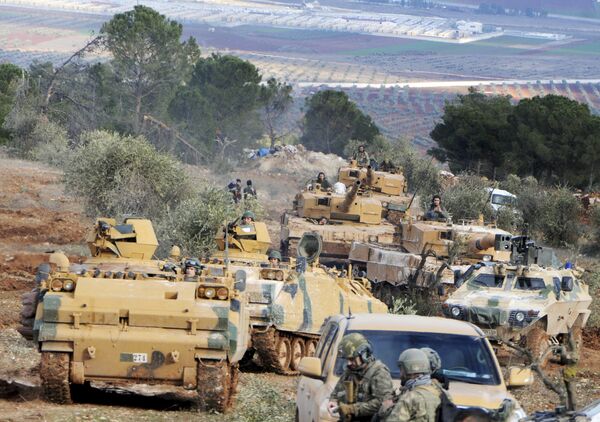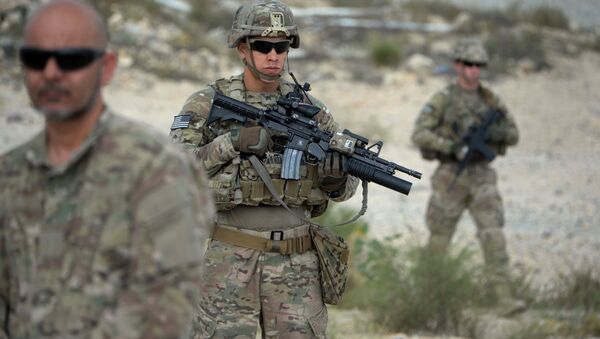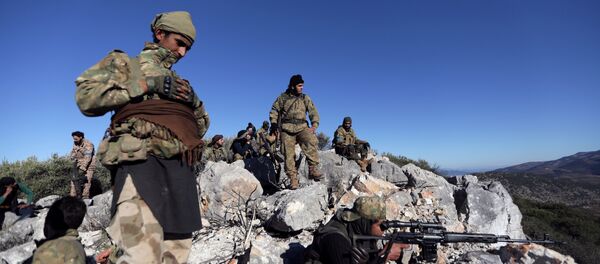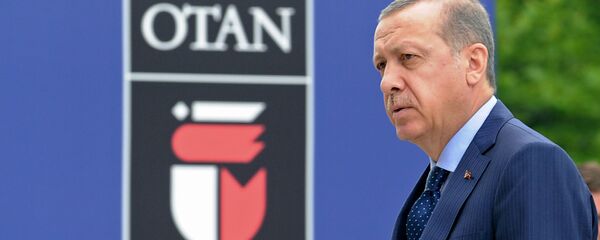Although Ankara has recently reproached NATO for its inaction that does not necessarily mean that President Recep Erdogan wants the alliance to intervene in the country, Turkish security analyst Can Unver suggests.
"In my opinion, the Turkish president's remark [about NATO] should be regarded as a rebuke rather than a call for action," Unver told Sputnik Turkey. "It is known that Turkey has been a NATO member since 1952 and has been fulfilling its obligations to the alliance. Previously, the Turkish military forces were sent to support NATO in Afghanistan, Somalia and the Balkans. Therefore, under the circumstances, Erdogan has reproached NATO with inaction. The truth of the matter is that while fighting against terrorism Turkey has not gained support from the West; moreover, it is known that Western countries led by the US continue to assist a terrorist organization that threatens Turkey's security."
Unver referred to Washington's support for the People's Protection Units (YPG), which Ankara regards as an affiliate of the Kurdistan Workers' Party (PKK) which is designated as a terrorist organization by Turkey, the US and the EU.
"Hey NATO where are you? We're fighting so much. NATO, isn't Turkey a NATO country? Where are you? You've invited NATO-member states to Afghanistan," Erdogan said at a gathering of the ruling Justice and Development party in the Turkish city of Mersin.
According to Unver, it is unlikely that Turkey expects NATO to provide arms to the country: "The point is that there is no sufficient justification for such a step," the security analyst noted. "However, Turkey does not need [weapons supplies]."
What really triggers Ankara's concerns is the alliance's inconsistent position on Turkey's ongoing operation in the Syrian city of Afrin. The analyst cited Secretary General of NATO Jens Stoltenberg, who previously stated that the Atlantic military bloc understands Ankara's motivation. However, last week NATO Deputy Secretary General Rose Gottemoeller made quite an opposite statement, Unver added.
"We have repeatedly heard contradictory statements from Western countries regarding Turkey," the security analyst highlighted.

NATO's Potential Intervention in Syria Will Serve Solely US Interests
For his part, Cahit Armagan Dilek, director of the Ankara-based 21st Century Turkey Institute, expressed concerns over NATO's potential involvement in Syrian affairs.
"In my opinion, NATO's intervention in Syria will only facilitate the implementation of US plans," Dilek said. "Turkish President Recep Tayyip Erdogan probably wants NATO to oppose the Kurdistan Workers' Party (PKK) and Kurdish self-defense units (YPG). However, NATO does not consider the PKK as a threat, and therefore does not intend to take action against it. Therefore, it is futile to expect that NATO will oppose the PKK and the Democratic Union Party (PYD), which virtually no country in the world recognizes as a terrorist organization."
"Turkey cooperates with Russia in the area west of the Euphrates. America wants to invade this area by hook or by crook. In fact, America is seeking to extend its control to the entire territory of northern Syria," the Turkish scholar suggested.
He quoted former US Secretary of State Rex Tillerson, who said during his recent visit to Turkey that the two countries will set up "mechanisms" to maintain control over northern Syria.
"Consequently, the US intends to invade the territories stretching from Haseke to Afrina, even further — to Idlib," he presumed.
"Those who keep an eye on American political strategy know perfectly well how this happens," he noted. "When America makes an offer to some country, it may seem attractive at the first glance, but once the proposal is adopted, more and more elements serving the US interests begin to emerge. I was in Iraq from 2003 to 2010, and had an opportunity to see how these American mechanisms work. Therefore, the discussion of these mechanisms during [Mevlut Cavusoglu's] meeting with Tillerson gives me cause for concerns about the further development of the situation in Syria."
The views and opinions expressed by Can Unver, Cahit Armagan Dilek are those of the contributors and do not necessarily reflect those of Sputnik.





